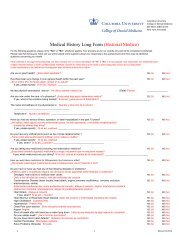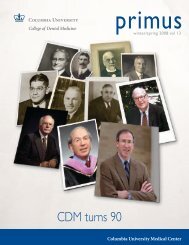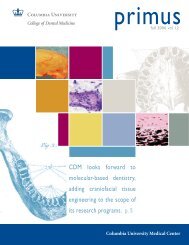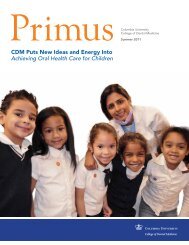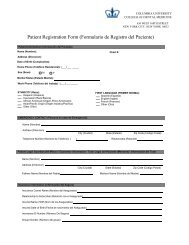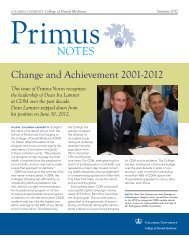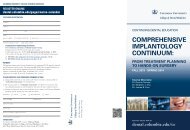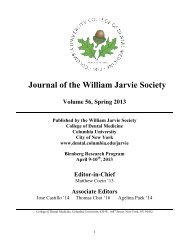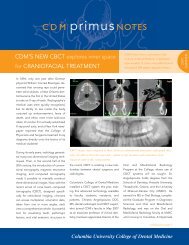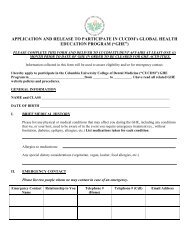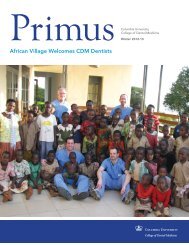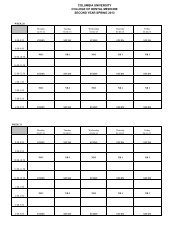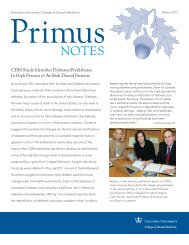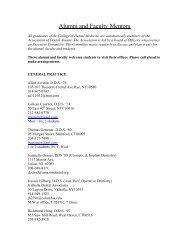Winter 2012 - College of Dental Medicine - Columbia University
Winter 2012 - College of Dental Medicine - Columbia University
Winter 2012 - College of Dental Medicine - Columbia University
Create successful ePaper yourself
Turn your PDF publications into a flip-book with our unique Google optimized e-Paper software.
CDM and Teachers <strong>College</strong> Grant<br />
DDS/MA and PhD in Science Education<br />
<strong>of</strong> presenting an integrated introduction to<br />
dentistry's various disciplines which, in the past,<br />
have been addressed separately in the curriculum.<br />
This approach shows by example that, in<br />
the real world <strong>of</strong> clinical treatment, it may be<br />
necessary to apply knowledge from a spectrum<br />
<strong>of</strong> disciplines rather than relying on a single<br />
area <strong>of</strong> expertise.<br />
Drs. Laureen Zubiaurre and Roseanna Graham, who have both studied in the<br />
Science Education program, are helping to introduce innovations in academic<br />
teaching throughout CUMC.<br />
Pedagogical training, stressing the theory and practice <strong>of</strong><br />
education, has not <strong>of</strong>ten been a major consideration in teaching<br />
sciences fundamental to medicine and dentistry.<br />
In 2005 Vice Dean Letty Moss-Salentijn and Special Reseach Scientist Dr.<br />
Marlene Klyvert in the <strong>College</strong> <strong>of</strong> <strong>Dental</strong> <strong>Medicine</strong> joined Dr. O. Roger Anderson,<br />
chair <strong>of</strong> the Mathematics, Science and Technology Department at<br />
the Graduate School <strong>of</strong> Education, Teachers <strong>College</strong>, <strong>Columbia</strong> <strong>University</strong>,<br />
to establish an integrated program in Science Education, granting the DDS/<br />
MA for students and the PhD for faculty. <strong>Columbia</strong>'s advanced degrees<br />
in the study <strong>of</strong> current and innovative methods for educating dental students<br />
appear to be the first granted at an institution <strong>of</strong> higher learning<br />
in the United States.<br />
Nine CDM students have completed the joint degree program, six are<br />
currently enrolled, and an additional three have taken courses at Teachers<br />
<strong>College</strong> without pursuing a degree. Dr. Roseanna Graham, an associate<br />
pr<strong>of</strong>essor in the Division <strong>of</strong> Operative Dentistry, earned both the first DDS/<br />
MA and PhD degrees granted under this program. Her colleague, Associate<br />
Dean Laureen Zubiaurre, is a current PhD candidate in the program. Both<br />
Dr. Graham and Dr. Zubiaurre work with the CUMC Institute for Teaching<br />
and Learning to foster discussion about best practices and innovations in<br />
pedagogy across the Medical Center campus.<br />
A major addition to CDM's preclinical training is case-based instruction,<br />
built around evidence taken from patients treated by third and fourthyear<br />
students in CDM clinics. These cases demonstrate the positive effect<br />
With this inclusive approach, small, facultyled<br />
student groups gain a unified armamentarium<br />
<strong>of</strong> diagnostic and treatment planning<br />
skills before beginning to train on patients<br />
in the clinical setting. Analysis <strong>of</strong> complex<br />
cases and simulation <strong>of</strong> dental procedures<br />
relating to their (manikin) patients augments<br />
learning through preparation and restoration<br />
<strong>of</strong> specially fabricated acrylic teeth that<br />
simulate the pathology <strong>of</strong> each case.<br />
Simultaneously, students learn to use the<br />
Electronic Health Record and interpret digital<br />
radiographs, making the transition into clinical<br />
patient care smoother and less stressful, so<br />
that students are more comfortable treating<br />
their first patients. Their practical skills, clinical<br />
preparedness, and competence are assessed<br />
through Comprehensive Objective Structured<br />
Clinical Examinations (OSCEs), Portfolios, and<br />
Case Presentations. During an OSCE, students<br />
may need to evaluate radiographs and models,<br />
interview a standardized patient, or demonstrate<br />
the use <strong>of</strong> an instrument to an examiner.<br />
Student case presentations made in a group<br />
setting allow faculty and students to interact<br />
and discuss various clinical situations, which,<br />
as Dr. Zubiaurre says, "helps our students<br />
learn the important steps in documenting<br />
and presenting cases clearly and conciselya<br />
skill essential to the postdoctoral training<br />
that many <strong>of</strong> them choose.”<br />
8 primus | winter <strong>2012</strong>-13



